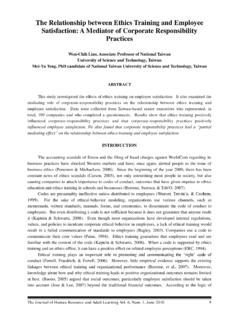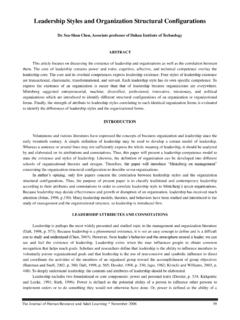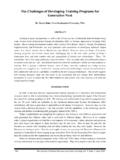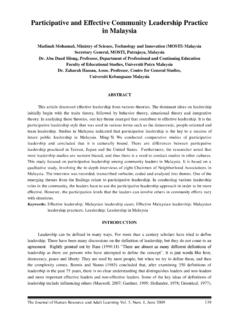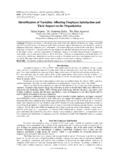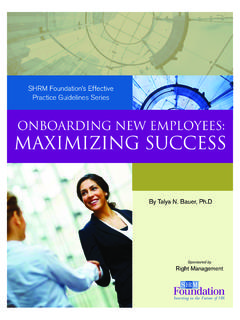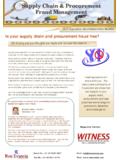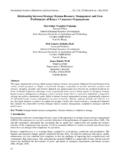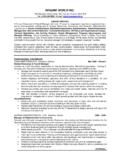Transcription of Structural Investigation of the Relationship …
1 The Journal of Human Resource and Adult Learning Vol. 6, Num. 1, June 2010 41 Structural Investigation of the Relationship between Working Satisfaction and employee turnover Chen, Ying-Chang, Department of Hotel and Restaurant Management Ching Kuo Institute of Management and Health, Taiwan Wang ,Wen Cheng, Department of Business Management, Hwa Hsia Institute of Technology, Taiwan Chu, Ying Chien, Department of Tourism and Leisure, National Penghu University, Taiwan ABSTRACT In this paper, researchers evaluate a model of working satisfaction in employee turnover , survey data were collected from 100 hotel employees in XinHua hotel. The article proposes human resource management features based on the analysis of the reasons for the brain drain in the hotel, policies accordingly.
2 There were several main findings from our empirical analyses. (1) Providing career advancement opportunities is critical for retention. (2) A mentoring program can help decrease the employee turnover of the small- and- medium sized hotels. (3) High-quality communicating is valuable for hotel policy. (4) Pay and welfare also indicate significant position in Human Resource Management in the hospitality industry. The Investigation of working satisfaction reflects the status of human resource in the hotels, through this, positive reactions can be made, and encouragement system can be adjusted, so that employees get more satisfaction, employee turnover is reduced and performance can be improved.
3 Keywords: working satisfaction, hotel policy, employee turnover , XinHua hotel INTRODUCTION In face of an more and more competitive environment in the era of new knowledge economy, the role excellent employee play in an enterprise gains more weight and value than before and become the solution to a success of companies in today s hospitality industry. Employees in hotels are significant because they are mostly important to the development of the hotels; employees' attitudes and behaviors play a vital role in the quality of work. In this regard, employees are primarily responsible for providing a sustainable competitive advantage for the s hotels.
4 Therefore, success in the hotels depends on managing and retaining employees. The hotels are generally more frequent flows of human resources. The hotels access to the human resources of high frequency compared to the other enterprises. The possibility of a brain drain in hotels is more than for other enterprises. At present, the hotels have become an important force in China's national economic development, but compared with larger enterprises, the overall weaker competitiveness of the hotels, particularly the employee turnover problem is more serious than other enterprises, to a certain extent; it has had a serious impact on the healthy and stable development of the hotels.
5 Service quality in the hospitality industry is essential than manufacturing industry enterprises. The intensity of a larger work, in particular, some of the key positions in management and technical personnel to conduct regular is higher intensity of the work. If without remuneration or individuals development opportunities that they expected the outflow The Journal of Human Resource and Adult Learning Vol. 6, Num. 1, June 2010 42 from the enterprise is easy. Because these people not only have the skills, but also management experience. They outflow from the enterprise, not only the commercial technological secrets away, but also customers being away.
6 The hotels will suffer direct losses. It will increase the replacement human resource cost and affect the continuity and quality of the work, therefore also affect the stability of the serving staff. Thus, hotels managers should understand that the rational flow of talent is a basic characteristic of a market economy and does not fear the other talent flow. The key management personnel of the hotels should be intensifies efforts and incentive, avoiding wastage of human resources caused by excessive losses. LITERATURE REVIEW For decades, researcher and business people alike have realized that the first contact that employees have with an organization after being hired is crucial for their success in the workplace (Buchanan, 1974).
7 The phenomena of employee turnover in the hotels are always being focused on by managers and the academics because employee s attitudes and behaviors play a vital role in the development of hotels. And this problem has many relationships with employees working satisfaction and corporation s encouragement. Locke (1969) point out the issue of employee satisfaction has been considered in numerous studies. Robbins and Coulter (1996) stated that employee satisfaction is an employee s general attitude towards his/her work, and when people speak of an employee s attitudes, they are likely to be referring to his/her employee satisfaction.
8 The present study addresses working satisfaction from all organizational perspective. This research focus on how organizations can increase their workers' employability orientation, that is, their openness to adapt to changing work requirements through flexible and broader skills and a readiness to change tasks and jobs (Van Dam, 2004). Job satisfaction may arise from many different sources, including levels of role ambiguity, autonomy, quality of supervision, quality of social relationships, and level of support in the workplace. The satisfaction turnover Relationship may also be moderated by other variables such as gender or mood. It is unclear how strong the job satisfaction turnover intention Relationship should be given that it may depend on specific aspects of work in particular organizations, such as hotel or food and beverage industry (George & Jones, 1996).
9 Working satisfaction can reduce absence and employee turnover , it also can reduce the rate of accidents. However, in the longer term, adverse effects such as loss of trained employees, unrealized productivity, and lowered morale often translate into lower financial gains than anticipated (Cascio, 2002). Van Dick et al. (2004) found evidence that organizational identification predicted turnover intention but the Relationship was partially mediated by job satisfaction. Meyer and Allen (1997) suggest that the most variables include work experiences, socialization experiences, management practices, personal characteristics, and environmental conditions. These variables begin with work experiences, role states and psychological contracts, followed by affect, norm and cost related judgments.
10 Pay can be a factor in decisions to stay or leave. Data suggest dissatisfaction with pay can be a key factor in turnovers. In the hotels, one of the most critical intangible costs is the loss of employee morale for those employees who choose to remain with the hotels. These results in the poor morale of employees who may be overworked, and can, in turn, affect the level of productivity efficiency. In this paper, researchers address this latter issue through empirical examination of the impact of turnover on operating performance. employee turnover is particularly important in the hotels due to the high levels of productivity efficiency (Warren, 2002).
